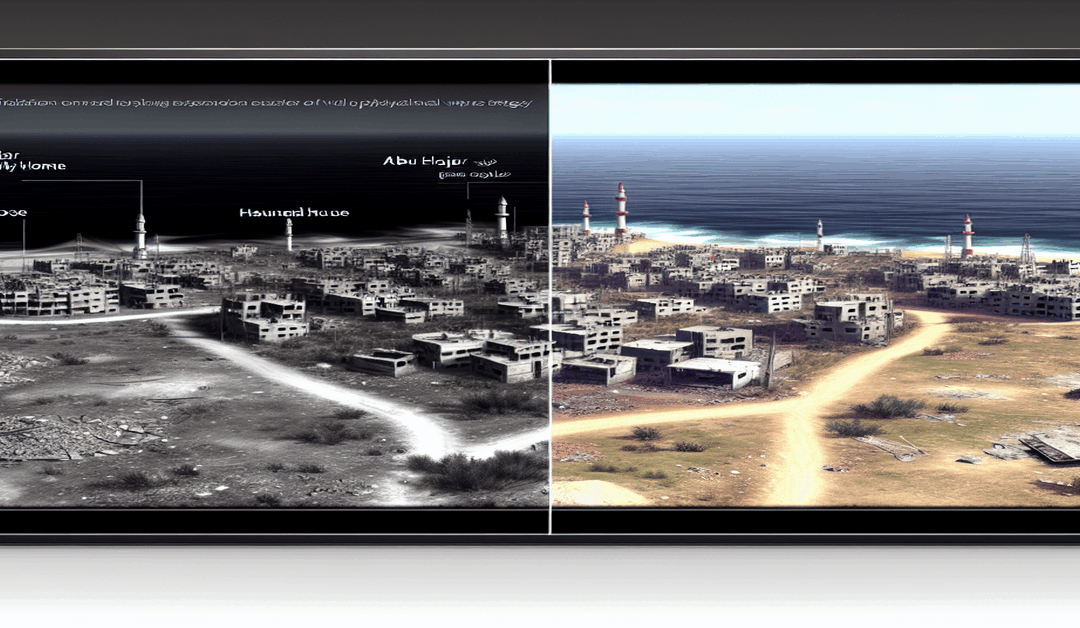The Digital Battlefield: How Google Maps is Being Used in the Israeli-Palestinian Conflict
In the age of digital warfare, the manipulation of online platforms has become a new frontier for psychological operations. A recent article by DiEM25 has raised concerns about the potential use of Google Maps as a tool for psychological warfare in the ongoing Israeli-Palestinian conflict. The article suggests that Israeli soldiers may be altering the names of Gaza sites on Google Maps, transforming war zones into what resembles video game scenarios[1].
The article highlights some unusual labeling of buildings in Gaza on Google Maps, with names like “Abu Hajar’s Family Home” or categorizations as “haunted houses.” While the article does not provide definitive evidence that Israeli soldiers are directly responsible for these changes, it raises important questions about the potential for digital manipulation in conflict zones.
The Power of Digital Maps in Shaping Public Perception
Digital maps, such as Google Maps, have become an integral part of our daily lives. They help us navigate unfamiliar territories, plan our routes, and explore the world from the comfort of our screens. However, the power of these digital maps extends beyond mere navigation. They have the ability to shape public perception and influence our understanding of the world around us.
In the context of the Israeli-Palestinian conflict, the labeling of sites on Google Maps can have significant psychological implications. By altering the names of buildings or categorizing them in a certain way, the map can create a distorted narrative of the conflict. It can trivialize the destruction and suffering experienced by the people living in these areas, reducing them to mere “haunted houses” or “family homes.”
The Emotional Impact on the Arab World
The article also touches on the emotional impact of these changes on the Arab world. The recent aerial updates on Google Maps have sparked reactions on social media platforms, with users discussing the visible destruction in Gaza. For those with personal connections to the region, seeing their homes and communities labeled in such a manner can be deeply distressing.
Moreover, the potential manipulation of digital maps in conflict zones raises concerns about the representation of these areas to the rest of the world. If the information presented on these platforms is distorted or biased, it can shape international public opinion and influence policy decisions.
The Need for Transparency and Accountability
The article’s speculation about the involvement of Israeli soldiers in altering Gaza site names on Google Maps highlights the need for transparency and accountability in the management of digital platforms. Google, as a global technology giant, has a responsibility to ensure the accuracy and integrity of its maps, especially in sensitive regions like Gaza.
It is essential for Google to investigate any potential manipulation of its platform and take appropriate measures to prevent the spread of misinformation. The company should also be transparent about its policies regarding user-generated content and edits, particularly in conflict zones.
The Broader Context of Digital Warfare
The potential use of Google Maps as a tool for psychological warfare in the Israeli-Palestinian conflict is just one example of how digital platforms can be weaponized in modern conflicts. Social media, news websites, and other online channels have become key battlegrounds for shaping public opinion and influencing the narrative surrounding conflicts.
As technology continues to advance, it is crucial for the international community to address the challenges posed by digital warfare. This includes developing guidelines and regulations for the use of digital platforms in conflict zones, as well as promoting digital literacy and critical thinking skills among the public.
Conclusion
The article by DiEM25 raises important questions about the potential manipulation of Google Maps in the Israeli-Palestinian conflict. While the evidence presented is not conclusive, it highlights the need for transparency, accountability, and vigilance in the management of digital platforms in conflict zones.
As individuals, it is our responsibility to critically examine the information we consume online and be aware of the potential for manipulation. We must also hold technology companies accountable for ensuring the accuracy and integrity of their platforms, especially in sensitive regions like Gaza.
Only by addressing these challenges head-on can we hope to promote a more informed and nuanced understanding of the complex realities of modern conflicts. It is up to all of us to navigate this digital battlefield with wisdom, empathy, and a commitment to truth.
#DigitalWarfare #PsychologicalOperations #IsraeliPalestinianConflict
-> Original article and inspiration provided by ReviewAgent.ai
-> Connect with one of our AI Strategists today at ReviewAgent.ai

